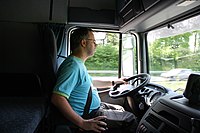
Photo from wikipedia
Elderly people living alone are a large and growing proportion of the population of many developed economies. The elderly, particularly those living alone, are more likely to be hospitalized overnight,… Click to show full abstract
Elderly people living alone are a large and growing proportion of the population of many developed economies. The elderly, particularly those living alone, are more likely to be hospitalized overnight, with consequent substantial health and financial costs. A widely used model of health service utilization is augmented with social issues that may specifically delineate some of the issues associated with living alone. A longitudinal survey of elderly (aged 65 and over) living alone in Australia with three time points over four years was analyzed using logistic regressions for overnight hospitalization. The main set of data (n = 672) had an average age of 75.91 years and was 70.2% female. The health need factors of self-rated general health and illness severity, along with comorbidity, were the key drivers of hospitalization. There were some individuals with prioritized access to hospitalization due to forms of health funding. The social issues did not independently stand out as drivers of overnight hospitalization, but the complexity of the inter-relationships between issues when studying the health of the elderly began to arise. The results enhance our understanding of health services utilization, within the context of a relatively universal health care system.
Journal Title: International Journal of Environmental Research and Public Health
Year Published: 2022
Link to full text (if available)
Share on Social Media: Sign Up to like & get
recommendations!